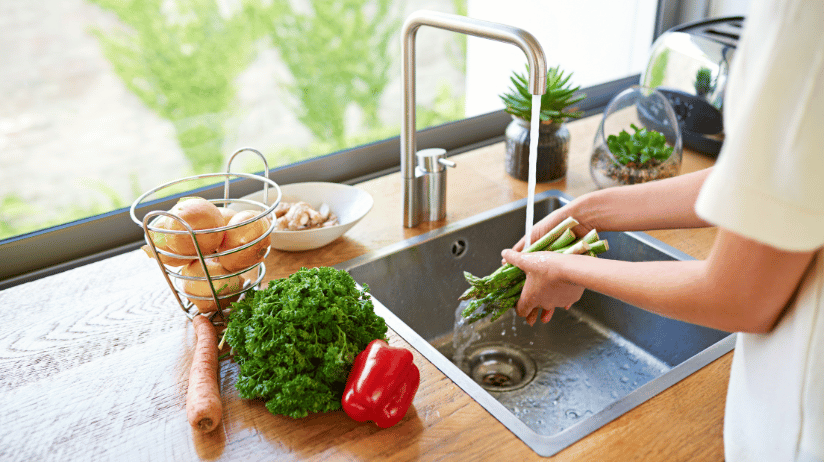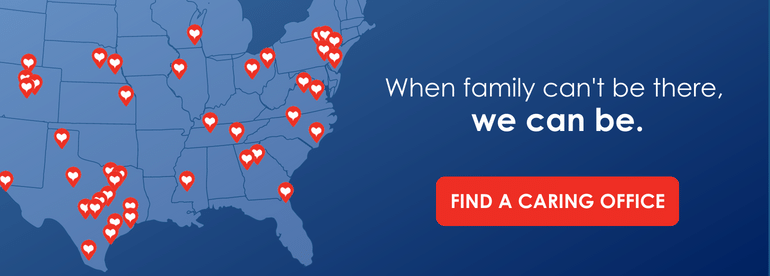One important aspect of caring for a senior is ensuring their meals are not only nutritious but also safe to consume. Senior citizens are more vulnerable to food-borne illnesses because of weakened immune systems and underlying health conditions. By following proper food safety guidelines, caregivers can help prevent potential health risks and provide the best care possible.
Let's discuss essential food safety caregiver tips to keep in mind when preparing and serving meals.
1. Practice Good Hand Hygiene
Before preparing food, thoroughly wash your hands with soap and water for at least 20 seconds. Warm or cold water works just fine! Make sure to get in between your fingers and even under your nails if possible. This step helps prevent the transfer of germs and bacteria from your hands to the food.
You should also wash your hands after you touch raw meat, poultry seafood, and eggs. And after you blow your nose, sneeze, or cough into your hands. Caregivers should also encourage those they care for to maintain good hand hygiene, too. This can significantly reduce the risk of contamination.
RELATED CONTENT: Proper Hand Hygiene to Prevent Illness
2. Store Food Safely
Proper food handling and storage are critical to preventing food-borne illnesses and food poisoning. Caregivers should ensure that all perishable foods, such as meat, poultry, dairy products, and leftovers, are stored at the appropriate temperature. Refrigerators should be set to 40°F (4°C) or below, while freezers should be at 0°F (-18°C) to keep food fresh and safe to eat. Other foods may also not be safe to leave out at room temperature, so check the labels.
If you are storing leftovers, make sure to put the food into the fridge or freezer within 2 hours of cooking. Additionally, regularly check expiration dates and discard any items that have gone bad. Make sure you look at food items in the fridge, pantry, cupboards, and foot storage.
3. Separate Raw & Cooked Foods
Eating contaminated food is one main cause of food-borne illness, so it's important to avoid cross-contamination. Caregivers should separate raw meats, poultry, and seafood from ready-to-eat foods to prevent the transfer of harmful bacteria. Try and keep these items separated even in your shopping cart and refrigerator.
Always use separate cutting boards and utensils for raw and cooked foods. Wash your kitchen tools thoroughly between uses with hot, soapy water.
4. Cook Meat Thoroughly
Proper cooking temperatures killing harmful bacteria that may be present in raw foods. Use a food thermometer to ensure that meat is cooked to the recommended internal temperature. You can't always tell just by looking at it. Serving undercooked foods can pose a significant health risk, especially for seniors.
Here are some of the safe temperatures for common meats:
- Beef, pork, and lamb: 145°F
- Poultry: 165°F
- Ground meat: 160°F
- Fish: 145°F
If you are using a marinade for your meat, do not reuse them unless you bring it to a boil first. For example, if you want to use a marinade as a sauce, too, you need to boil it after marinating the meat or make a fresh batch.
5. Be Mindful of Allergies & Dietary Restrictions
Seniors may have allergies or dietary restrictions that caregivers need to be aware of when planning meals. Always read food labels carefully to identify potential allergens. Communicate with your senior's family members or healthcare provider to understand their dietary limitations. Being cautious about allergies and restrictions can help prevent adverse reactions and ensure their safety.
6. Regularly Clean & Sanitize
Maintaining a clean kitchen environment is key. Clean countertops, utensils, cutting boards, and appliances regularly with hot, soapy water. Sanitize surfaces that come into contact with raw foods to prevent the spread of harmful bacteria. You can also use a solution of 1 tablespoon of unscented bleach per gallon of water to effectively disinfect surfaces.
7. Wash Produce
While it's tempting to start chopping fruits and veggies right away, you should wash them first to avoid contamination. Germs can live on the peel or skin of fruits and vegetables. The germs can contaminate the inside of the produce when you start cutting.
Wash all fruits and vegetables under cold running water, even if you are going to peel them. You don't need to use soap on produce, just make sure the outside has been fully rinsed.
RELATED CONTENT: 8 Foods to Boost Your Immune System
8. Plan & Prepare Ahead
Senior caregivers often have busy schedules, but planning and preparation can go a long way in ensuring food safety. Prepare meals in advance, so you're not rushed during cooking. Consider batch cooking and freezing individual portions for easy reheating. This approach not only saves time but also reduces the risk of cross-contamination during meal preparation.
9. Stay Informed
Food safety guidelines and recommendations may change over time, so stay informed about the latest developments. Reliable sources, such as government health agencies and reputable food safety organizations, can provide up-to-date information and resources for you to follow.
Providing safe and nutritious meals is a key role of senior caregiving. By following these food safety tips, you can reduce the risk of food-borne illnesses, promote health and well-being, and ensure seniors receive the care they deserve.
If your or a loved one needs assistance with safe meal preparation, reach out to your local team of Caring Senior Service caregivers.


